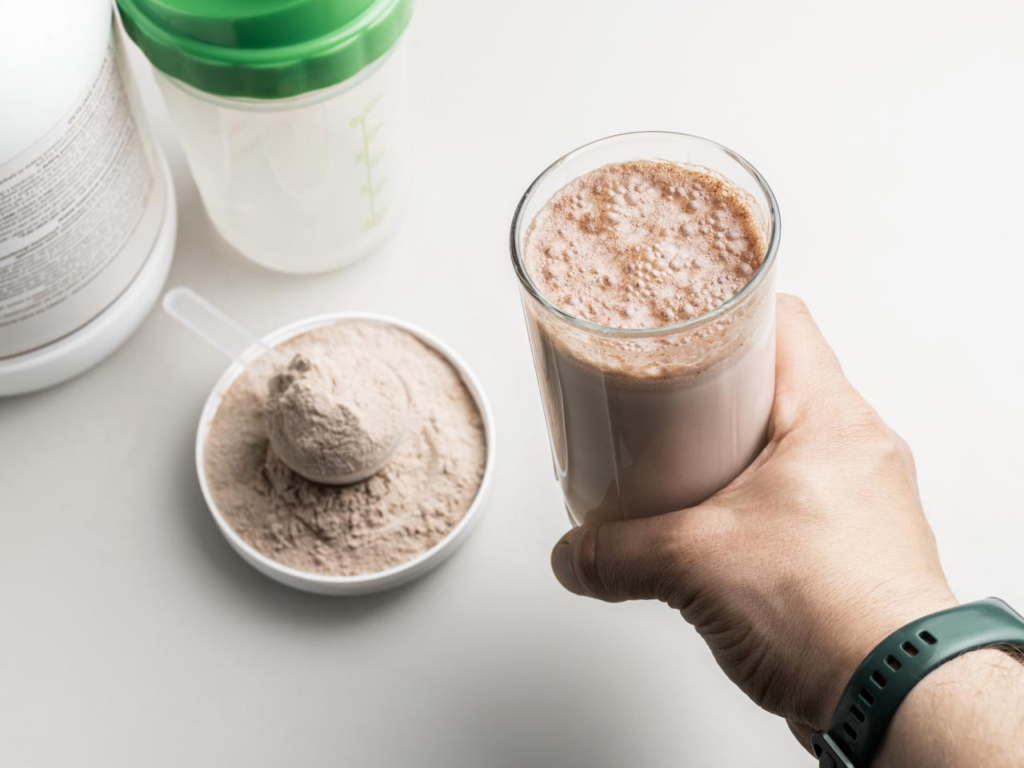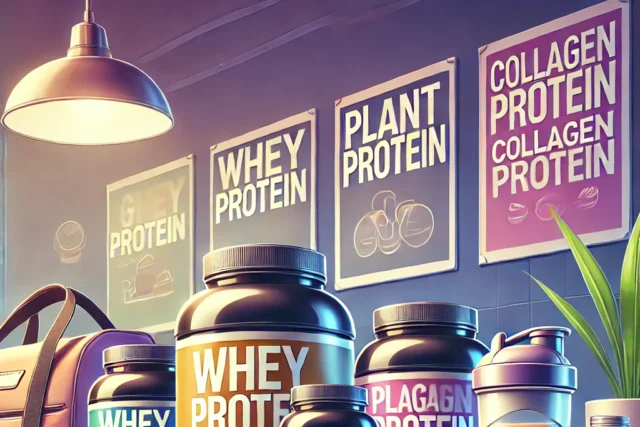Introduction
Achieving your fitness goals requires dedication, strategy, and the right nutrition. Among the essentials, protein is the cornerstone of muscle recovery, growth, and overall performance. But let’s face it—getting enough protein through meals alone can be a challenge. Enter protein powders, the convenient, versatile, and effective way to meet your dietary needs.
With so many options on the market, choosing the right protein powder can feel like walking through a maze. Should you go for whey or plant-based? Is casein better for recovery? Don’t worry; we’re breaking it all down so you can find the perfect match for your fitness journey.
Table of Contents
Understanding the Basics of Protein Powder
What Is Protein Powder?
Protein powder is a concentrated source of protein derived from animal or plant-based sources. Common forms include whey, casein, soy, and pea protein. It’s a supplement, not a replacement, designed to complement your diet and bridge any nutritional gaps.

Why is it so popular? Convenience. Whether you’re rushing after a workout or need a quick protein fix, these powders are an easy solution. They can be mixed into shakes, smoothies, or even used in recipes like pancakes or muffins.
Benefits of Protein Powder
Protein powder is more than just muscle food. Its benefits extend to:
- Muscle Growth and Recovery: Ideal for strength trainers and athletes.
- Weight Management: Keeps you fuller for longer, aiding in calorie control.
- Overall Health: Supports skin, hair, nails, and immune function.
Types of Protein Powders

Whey Protein
Whey is the reigning champ in the protein world, known for its fast absorption and high amino acid content. It’s particularly rich in leucine, which is crucial for muscle synthesis. If you’re looking for quick recovery after intense workouts, whey is your go-to.
Casein Protein
Unlike whey, casein digests slowly, releasing amino acids over several hours. This makes it perfect as a nighttime protein to prevent muscle breakdown while you sleep.
Plant-Based Protein
Plant-based options like pea, hemp, and rice protein are growing in popularity. They’re great for vegans, vegetarians, and those with dairy allergies. While they may have slightly less protein per scoop than whey, they often contain added nutrients like fiber.
Egg Protein
Egg protein is another excellent option, boasting high digestibility and a complete amino acid profile. It’s a solid choice for those avoiding dairy but still wanting a high-quality protein source.
Collagen Protein
While not a traditional choice for muscle building, collagen protein supports joint, skin, and bone health. It’s an ideal addition for older adults or anyone focusing on overall wellness.
Factors to Consider When Choosing a Protein Powder

Your Fitness Goals
The type of protein powder you choose should align with your goals:
- Weight Loss: Opt for low-calorie, high-protein powders like whey isolate.
- Muscle Gain: Choose powders with high protein content and added BCAAs.
- Endurance Recovery: Look for a balanced protein-carb blend.
Nutritional Content
Read the label! Check for:
- Protein-to-Calorie Ratio: Ideal for fat loss or lean muscle gain.
- Additives: Avoid excess sugars, artificial flavors, or fillers.
Dietary Restrictions and Allergies
If you’re lactose-intolerant or vegan, plant-based or egg protein might be your best bet. Gluten-sensitive? Double-check labels to ensure your choice is gluten-free.
Budget and Brand Reputation
While premium brands often boast superior quality, there are affordable options that don’t compromise on standards. Look for third-party testing and positive customer reviews.
Common Myths About Protein Powder
Myth 1: Protein Powder Causes Weight Gain
Protein powders themselves don’t cause weight gain. Weight changes are determined by your calorie intake versus expenditure. A calorie surplus leads to weight gain, while a deficit results in weight loss. Protein powder, with its high satiating properties, can even help control hunger and reduce unnecessary snacking, aiding weight management.
Myth 2: Protein Powders Are Only for Bodybuilders
This couldn’t be further from the truth. Protein powder supports various fitness goals, from endurance training to general wellness. It benefits athletes, busy professionals, and even older adults seeking to maintain muscle mass. Whether you’re aiming for a six-pack or simply better recovery, protein powder is for everyone.
Myth 3: Natural Protein Sources Are Always Better
While whole foods are excellent, they’re not always practical. Cooking a chicken breast post-workout or carrying boiled eggs in your gym bag isn’t convenient. Protein powders offer unmatched portability, consistent macronutrient ratios, and versatility. They’re a complementary tool rather than a replacement for whole foods.
How to Use Protein Powder Effectively

Timing Your Protein Intake
Timing is key to maximizing protein benefits.
- Post-Workout: Fast-digesting proteins like whey are perfect for muscle repair and growth after exercise.
- Before Bed: Slow-digesting casein provides sustained protein release, reducing muscle breakdown during sleep.
- Throughout the Day: For general dietary supplementation, a scoop can be used to fill gaps in protein intake.
Mixing and Recipes
Get creative with how you use protein powder:
- Mixing: Blend it with water, milk, or plant-based alternatives for a quick shake.
- Recipes: Add it to smoothies, oatmeal, pancakes, or even energy balls. For baking enthusiasts, protein brownies and muffins are a hit.
Monitoring Your Daily Protein Intake
Too much of a good thing can be harmful. Excess protein can strain your kidneys and lead to unwanted calories. Use tools like MyFitnessPal to track your intake and aim for 0.8–1.2 grams of protein per pound of body weight, depending on your goals and activity level.
Top Recommended Protein Powders for 2024
Best Whey Protein Powders
- Optimum Nutrition Gold Standard Whey: Trusted for its quality, taste, and high protein content per scoop.
- Dymatize ISO100: A pure isolate, perfect for those who want a fast-absorbing option with minimal carbs and fats.
Best Plant-Based Protein Powders
- Vega Sport Premium Protein: A vegan option with a complete amino acid profile, great for recovery.
- Orgain Organic Protein: Known for its smooth texture and clean, organic ingredients.
Best Budget-Friendly Options
- MyProtein Impact Whey: Affordable without compromising quality, offering a variety of flavors.
- NOW Sports Whey Protein Isolate: A cost-effective, unflavored option for those who prefer simplicity.
Conclusion
Choosing the best protein powder doesn’t have to be overwhelming. The right product depends on your goals, dietary needs, and preferences. Whey protein may be the gold standard for muscle recovery, but plant-based alternatives offer a compelling option for those with allergies or specific lifestyles. Always prioritize quality and ensure the product aligns with your fitness plan. With the right protein powder in hand, you’re well-equipped to fuel your journey to success.
Frequently Asked Questions
1. How much protein powder should I take daily?
This depends on your protein needs, which vary by activity level and body weight. A common recommendation is 20-40 grams post-workout.
2. Can protein powder replace meals?
No, protein powder should supplement your diet, not replace balanced meals. Whole foods provide essential vitamins and nutrients.
3. What’s the difference between isolate and concentrate whey?
Whey isolate has a higher protein percentage and fewer carbs and fats than concentrate, making it better for those aiming for low-calorie, high-protein intake.
4. Are there side effects to taking protein powder?
Excessive intake can lead to digestive discomfort, and individuals with pre-existing kidney issues should consult a doctor before use.
5. How do I store protein powder properly?
Keep it in a cool, dry place, sealed tightly to prevent moisture and clumping. Avoid direct sunlight for prolonged freshness.


MOST COMMENTED
Animal-Based Proteins / Casein Protein / Dietary Protein / High-Protein Diets / Pea Protein / Plant-Based Proteins / Protein / Protein Deficiency / Protein Supplements / Proteins / Whey Protein / Whey Proteins
Is Protein Powder Safe for Teenagers and Children?
Animal-Based Proteins / Casein Protein / Dietary Protein / High-Protein Diets / Pea Protein / Plant-Based Proteins / Protein / Protein Deficiency / Protein Supplements / Proteins / Whey Protein / Whey Proteins
Unlock the Power of Proteins for Optimal Gut Health
Multivitamin
Total Health: Multivitamin for Active Lifestyles
Multivitamin
WellnessFusion: Complete Multivitamin Support
Dietary Supplement
Revitalize Your Health: The Magic of Red Yeast Rice Capsules
Foot care / Foot Health
Revitalize Your Foot Care Routine: Essential Tips for Optimal Foot Health
Foot Problem / Diabetics / Foot Health
Diabetics: Mastering Footwear Selection for Enhanced Foot Health and Ultimate Comfort
Exercises and Footwear Tips for Hammertoe Relief / Foot care / Foot Health / Foot Pain / Foot Problem / Hammertoes
Unlock Effective Exercises and Footwear Tips for Hammertoe Relief
Hammertoes / Foot Health / Foot Pain / Foot Problem
Unlock Relief: Essential Guide to Hammertoes Causes, Symptoms, and Treatments
Foot Problem / Foot Health
Revolutionize Your Recovery: Natural Remedies for Plantar Fasciitis – Fresh Home Keepers